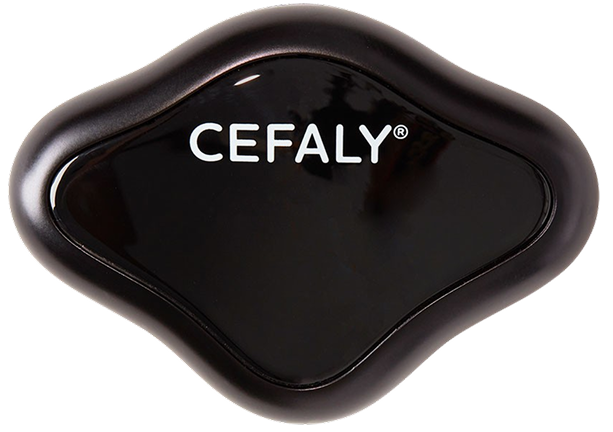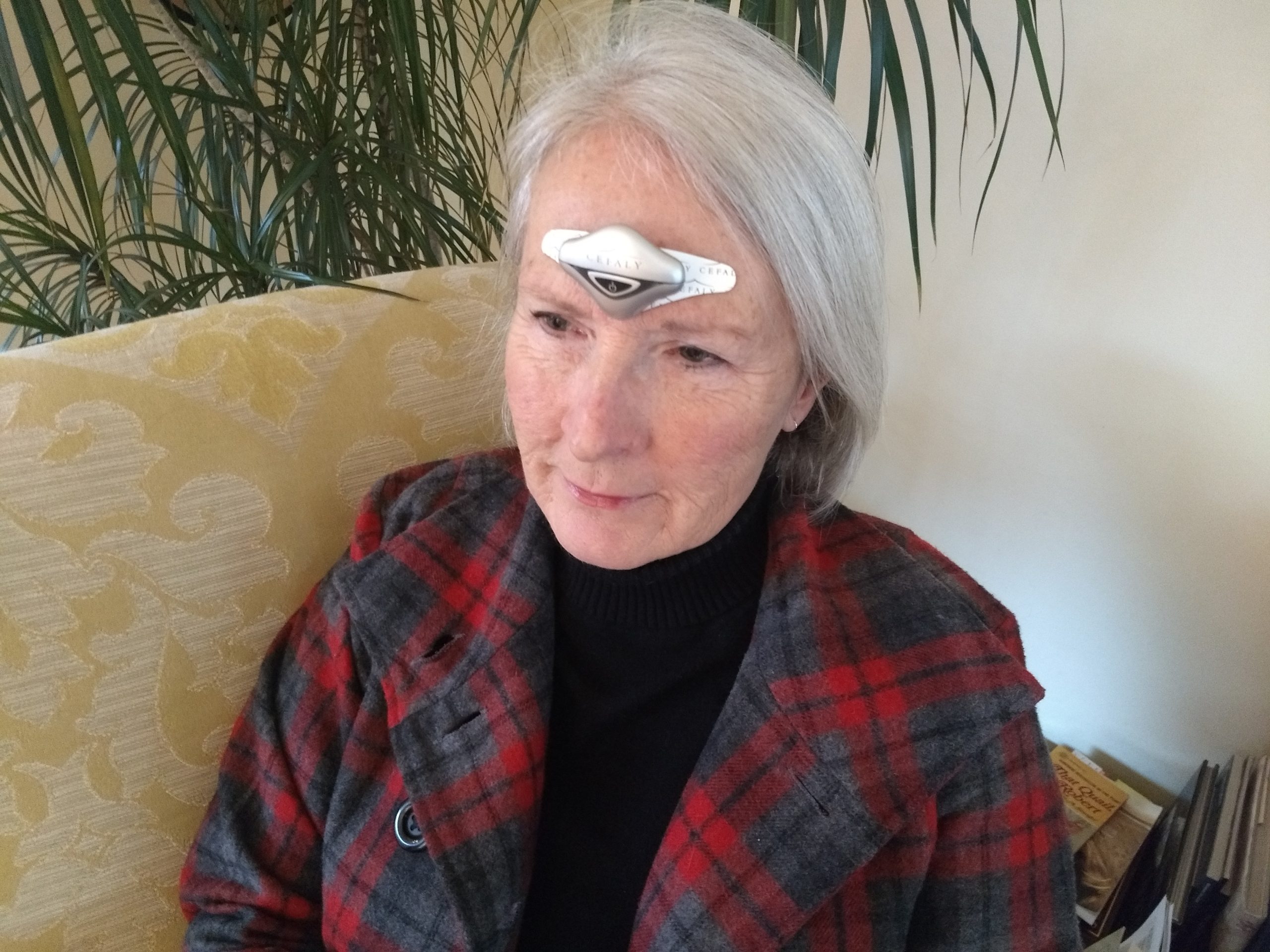Conventional wisdom tells us that breastfeeding can be beneficial for migraine by reducing the number of attacks. But that’s not the case for everyone! Is there a link between migraine and breastfeeding? If so, how can nursing individuals find migraine solutions that are effective while also safe for their babies?
If you’re struggling with migraine headaches and breastfeeding, it’s vital to understand your options. This article will also go into the details of treating and preventing breastfeeding migraine headaches.
- Links between postpartum, breastfeeding and migraine
- Safe migraine treatment options while breastfeeding
- Unsafe migraine medication options while breastfeeding
- Migraine headache prevention tips
Links between postpartum, breastfeeding and migraine
When considering the links between breastfeeding and migraine headaches, we need to go back to the basics — hormones. There is a complex link, one that is not yet fully understood, between a woman’s estrogen levels and migraine. However, there is the estrogen withdrawal hypothesis, which may answer some questions.
The theory suggests that a drop in estrogen levels may trigger migraine symptoms and attacks. If a woman’s estrogen levels fall between 45-50 picograms per milliliter (pg/mL) for an extended period, they may experience migraine onset.
Some also refer to this as menstrual-associated migraine (MAM), menstrual migraine or hormonal headaches. If you believe you’ve experienced MAMs before, we recommend consulting a healthcare professional to get a proper diagnosis.
The role of estrogen
Estrogen plays a vital role in the serotonergic and glutamatergic systems. Here’s how it works:
- Serotonergic system: Estrogen helps regulate serotonin receptors, affecting your mood and pain perception.
- Glutamatergic system: Estrogen also modulates glutamate receptors, influencing your cognitive functions and neuronal excitability.
This major female sex hormone is deeply connected to a woman’s central nervous system (CNS). As such, it’s clear why so much research points to estrogen fluctuations being a possible migraine trigger.
During pregnancy, your estrogen levels continuously increase from fertilization to term. This helps promote the growth and development of the uterus. Basically, estrogen prepares the uterus to support a growing fetus. The increased estrogen levels may result in a decreased number of migraine attacks for some.
However, after birth, your estrogen levels drop and destabilize, kickstarting those migraine headaches again.
Something interesting happens when you breastfeed. Many women experience lactational amenorrhea. It’s a period of temporary infertility marked by the absence of menstruation that comes with breastfeeding.
Each woman’s period of lactational amenorrhea differs — it could last a month, six months or more. For those who experience migraine, lactational amenorrhea and breastfeeding can provide some relief. How? During lactation, the hormone prolactin increases, which then stabilizes estrogen and other reproductive hormone levels. And then — you’ve guessed it — you may experience fewer migraine attacks while breastfeeding.
That said, when your menstruation cycle begins again, so will your migraine attacks.
Get Drug-Free Migraine Relief With CEFALY
Shop Now
90-day money back guarantee
FDA-cleared
financing available
Safe migraine treatment options while breastfeeding
So, what do you do if you’re still experiencing breastfeeding migraine headaches? You may have questions concerning the effects of medications on your baby.
The good news is that there are safe migraine treatment options and medications while breastfeeding, such as:
- Acetaminophen (Tylenol): Acetaminophen is generally considered safe for use while breastfeeding. It can be helpful for mild to moderate pain relief.
- Ibuprofen (Advil or Motrin): Most healthcare providers consider Ibuprofen the preferred nonsteroidal anti-inflammatory drug (NSAID) while nursing. It can help ease pain and inflammation associated with migraine.
- Beta-blockers: While primarily used to treat high blood pressure, beta-blockers, such as metoprolol, can help prevent migraine. Metoprolol is generally considered safe to take while breastfeeding, but you’ll want to talk to your doctor before taking any beta-blockers.
- Triptans: A few triptans, like sumatriptan, may help with migraine pains during breastfeeding. However, please consult a medical professional to learn which are safe for you.
All in all, we recommend speaking with a healthcare professional before taking any medications while breastfeeding.
Unsafe migraine medication options while breastfeeding
Having a migraine while nursing can be debilitating, but you must keep in mind that some medications are not suitable while you’re breastfeeding — and they include:

- Aspirin: Always consult your doctor before using aspirin while breastfeeding. If your doctor permits it, you can take aspirin in low dosages. It’s also thought to cause Reye’s syndrome in children. Reye’s syndrome is a serious illness that may cause seizures and sleepiness.
- Ergotamine: Ergotamine, which is prescribed to reduce severe migraine attacks, should not be used if you’re breastfeeding. Ergotamine and dihydroergotamine may have adverse effects on your baby, such as nausea, vomiting or fatigue. This medication may also decrease breast milk production, which may lead to poor weight gain for your child.
- Opiates: Codeine and tramadol, for example, should be avoided. The Food and Drug Administration (FDA) found that opiates may leave babies with severe breathing problems and excessive sleepiness. There is also the risk of infant death.
It’s always better to be on the safe side. Consult your doctor to find out which migraine relief options are best for you while breastfeeding.
Migraine headache prevention tips while breastfeeding
Preventing a migraine is always preferred to treating it. Here are a few tips to help you prevent breastfeeding migraine headaches:
- Identify triggers: Write everything down in a migraine diary. When and what foods did you eat? How much did you sleep? Once you’ve identified your triggers, try to avoid or minimize exposure to them. Also, if you do experience a migraine attack, track it! Tracking your migraine episode helps you better understand it and what triggered it.
- Stay hydrated: Dehydration can cause migraine attacks, so ensure you stay well-hydrated by drinking plenty of water throughout the day.
- Manage stress: Stress is a common trigger for migraine. To achieve a more relaxed state of mind, try deep breathing exercises or yoga.
- Exercise regularly: Doing some aerobic exercises can have a suppressive effect, which may help reduce migraine attacks. Exercise can also help reduce stress.
- Get rested: Although this can be challenging for nursing mothers, try to get enough rest. Lack of sleep or changes in sleep patterns can trigger migraine.
- Try non-pharmaceutical treatments: Neuromodulation migraine treatment devices can help prevent migraine episodes.

Find relief from your breastfeeding migraine with CEFALY
While you may experience a reprieve from migraine during pregnancy, many women experience migraine attacks after giving birth. It differs from person to person, and you may seek safe medications to ease your pain. Some medicines are safe, while others are not, so you should always consult a medical professional.
If you’re looking to go the drug-free route, consider CEFALY — a different approach to finding relief from migraine attacks. CEFALY is a wearable FDA-cleared migraine treatment device that can provide relief during episodes. Daily preventive treatments can help reduce migraine frequency.
Purchase your CEFALY device now and try a prescription-free, clinically proven approach to migraine management.














